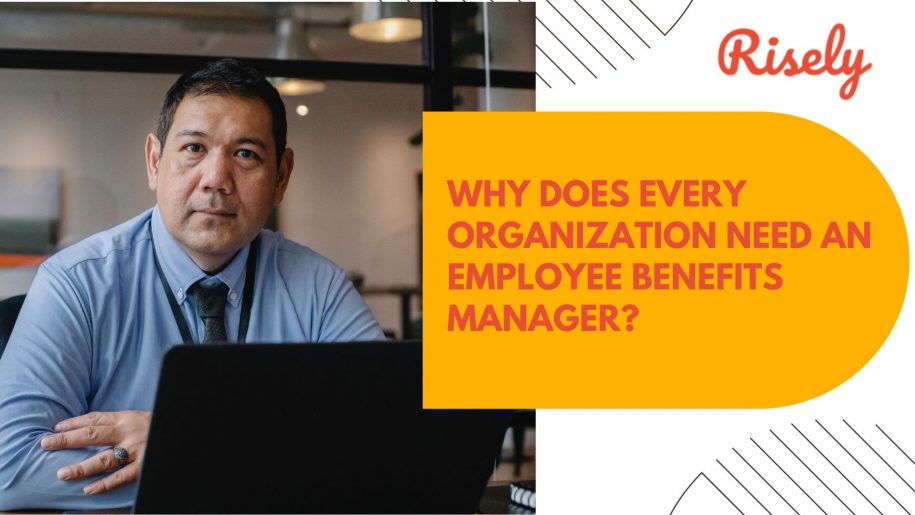Why does every organization need an employee benefits manager?
In today’s dynamic and competitive job market, organizations recognize that attracting and retaining top talent is a strategic imperative. As a result, employee benefits have taken center stage in human resources. Ensuring employees receive valuable and well-structured benefits packages is a mark of a caring employer and a critical factor in an organization’s overall success. This is where the unsung hero of the HR world comes into play—the Employee Benefits Manager. Tasked with the complex and ever-evolving role of designing, implementing, and managing benefits programs, Employee benefits managers are at the heart of ensuring that employees are well-compensated and supported in their overall well-being.Who is an Employee benefits manager?
An Employee Benefits Manager is a professional responsible for planning, developing, implementing, and administering employee benefits programs. Their primary role is to design and manage the various benefits packages and perks a company offers its employees. Employee benefits typically include health insurance, retirement plans, paid time off, wellness programs, and other forms of compensation beyond the basic salary.Role of an Employee benefits manager
- Benefits program development: They design and develop employee benefits programs that align with the company’s overall compensation and human resources strategy.
- Vendor selection: Employee Benefits Managers may be involved in selecting and managing relationships with benefit plan providers, such as health insurance companies, retirement plan administrators, and wellness program vendors.
- Compliance and regulations: They ensure that the organization’s benefits programs comply with all relevant laws and regulations, such as the Employee Retirement Income Security Act (ERISA), the Affordable Care Act (ACA), and others.
- Open enrollment: They oversee the open enrollment process, during which employees can choose their benefits for the upcoming year, and provide employees with information about available options.
- Communication: Employee Benefits Managers educate employees about their benefits options, answer questions, and address concerns.
- Budgeting: They may be responsible for budgeting and cost analysis related to benefits programs to ensure they remain cost-effective for the organization.
- Claims and issue resolution: They assist employees in resolving claims, disputes, or problems with their benefits.
Why is an Employee benefits manager important?
An employee benefits manager is essential for several reasons within an organization:- Attracting and retaining talent: Competitive employee benefits programs can attract top talent and help keep valuable employees. Skilled benefits managers can design packages that appeal to a wide range of candidates and meet the workforce’s diverse needs.
- Employee satisfaction: Effective benefits management contributes to higher employee satisfaction. When employees have access to comprehensive and well-structured benefits, they tend to be more content, boosting morale, productivity, and overall job satisfaction.
- Legal and regulatory compliance: The benefits landscape is complex, with numerous laws and regulations governing employee benefits, including health insurance, retirement plans, and leave policies. Benefits managers ensure that the organization remains compliant with these regulations, minimizing legal risks and potential penalties.
- Cost management: Benefits represent a significant portion of an organization’s budget. Benefits Managers are responsible for balancing the need to provide competitive benefits with managing costs effectively. They often negotiate with benefit providers to secure cost-effective plans for the organization.
- Employee education: Benefits managers play a role in educating employees about benefits options, helping them make informed decisions. This education can lead to better utilization of benefits, which, in turn, can improve overall employee well-being.
Skills and Traits required to become an Employee benefits manager
To excel as an employee benefits manager, you should possess a combination of skills, traits, and qualifications that enable you to effectively manage the organization’s benefits programs while also meeting the needs of employees.Skills
- Knowledge of benefits programs: A deep understanding of employee benefits programs, including health insurance, retirement plans, wellness initiatives, and other compensation-related benefits.
- Data analysis: The ability to analyze benefits-related data to make informed decisions, assess program effectiveness, and manage costs.
- Communication: Strong verbal and written communication skills to effectively educate employees about benefits options, communicate changes, and interact with providers and vendors.
- Negotiation: Negotiating skills for contract discussions with benefit providers to secure favorable terms and cost-effective solutions.
- Presentation skills: The capability to conduct effective benefits-related presentations and training sessions for employees and stakeholders.
Traits
- Ethical: A strong commitment to ethics and integrity, as employee benefits managers handle sensitive employee data and are responsible for compliance with legal and ethical standards.
- Detail-oriented: A keen eye for detail is essential when managing complex benefits programs, contracts, and compliance requirements.
- Empathetic: Empathy towards employees’ needs and concerns and the ability to approach benefits management focusing on employee well-being.
- Adaptability: The flexibility to adapt to changing regulations, employee demographics, and industry trends in benefits management.
Other Interesting Reads
Job Description Example for Employee Benefits Manager
Job Title: Employee Benefits Manager Job Summary: The employee benefits manager is responsible for the planning, development, implementation, and management of the organization’s employee benefits programs. This role involves designing and administering comprehensive benefits packages, ensuring compliance with relevant laws and regulations, and providing education and support to employees regarding their benefits options. The employee benefits manager collaborates with benefit plan providers, HR professionals, and senior management to create and maintain competitive and cost-effective benefits programs that align with the organization’s compensation and HR strategy. Key Responsibilities:- Benefits program development: Design, develop, and evaluate employee benefits programs, including health insurance, retirement plans, wellness initiatives, and other compensation-related benefits.
- Vendor Management: Select, negotiate, and manage relationships with benefit plan providers, ensuring service levels and contractual agreements are met.
- Employee Education: Educate employees about their benefits options, provide guidance on making informed choices, and address employee inquiries throughout the year.
- Budgeting and Cost Analysis: Manage the benefits budget, monitor costs, and analyze data to ensure cost-effectiveness while maintaining competitive benefits offerings.
- Policy Development: Contribute to the development and maintenance of policies related to employee benefits, including paid time off, health and wellness, and retirement.
- Health and Wellness Programs: Develop and manage health and wellness initiatives, including fitness programs, mental health support, and preventive care programs.
- Recordkeeping and Reporting: Maintain accurate records of benefits-related information, generate reports for senior management, auditors, and regulatory authorities, and ensure data privacy and security.
- Bachelor’s degree in human resources, business administration, finance, or a related field.
- Four years of experience in benefits management or a related HR role.
- Proficiency in benefits-related laws and regulations.
- Strong analytical, communication, and negotiation skills.
- Attention to detail, problem-solving abilities, and ethical conduct.
Conclusion
In the ever-evolving human resources landscape, Employee benefits managers play a pivotal role in shaping an organization’s success. They are the architects behind the benefits packages that attract, retain, and motivate employees. They are the experts who navigate the complex web of regulations, ensuring that the organization remains compliant. They advocate for employee well-being, providing support during times of need and guidance for a healthier, happier workforce. As we conclude our blog on the role of employee benefits managers, it becomes evident that their work goes far beyond spreadsheets and policy documents. They bridge the company’s vision and the employees’ reality, working diligently to strike a balance that benefits both. So, the next time you review your benefits package, attend an open enrollment session, or seek guidance on your retirement plan, remember the employee benefits manager—the unsung hero in the background, ensuring your needs are met and exceeded.Ready to enhance your skills as an Employee Benefits Manager?
Take the first step by trying free assessment on effective communication. Elevate your career today!
Other Related Blogs
The Top 10 characteristics to look for in Internal Champions
The Top 10 characteristics to look for in Internal Champions In every successful team, there’s a secret ingredient that drives success and propels the team forward. It’s the internal champion…
From limitations to possibilities: 18 Growth mindset statements
In pursuing personal and professional success, how we perceive challenges, setbacks, and abilities plays a significant role. Enter the concept of a growth mindset – a powerful belief system that…
The Power of Optimism In Leadership Become A Leader Your Team Wants
The Power of Optimism In Leadership Become A Leader Your Team Wants Have you ever noticed how some leaders always seem to see the glass as half full, even in…


